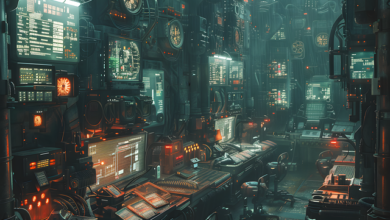“Revolutionizing the World: A Look at Future Technology Innovations”
"Revolutionizing the World: A Look at Future Technology Innovations"

Introduction
The pace of technological advancement is accelerating at an unprecedented rate, with innovations reshaping industries and everyday life. As we look to the future, new technologies will not only enhance existing systems but also open up entirely new realms of possibility. From artificial intelligence to space exploration, the technologies of tomorrow promise to redefine how we live, work, and interact with the world around us. In this article, we explore some of the most exciting future technology innovations and their potential impact on society.
AI and Machine Learning
Artificial intelligence (AI) and machine learning (ML) are already making waves in various industries, from healthcare to finance. In the future, AI will become even more integrated into our lives, automating mundane tasks, improving decision-making processes, and even taking on complex problem-solving roles. Machine learning algorithms will evolve, enabling AI to analyze vast amounts of data more efficiently and make predictions with higher accuracy. Innovations in AI will drive advancements in robotics, customer service, and even creative fields like art and music.
In healthcare, AI could revolutionize diagnostics, enabling doctors to identify diseases more accurately and at earlier stages. In the workplace, AI-driven automation could streamline operations, allowing companies to increase efficiency and reduce costs. While this presents challenges in terms of job displacement, the future of AI holds immense promise for improving the quality of life globally.
Quantum Computing
Quantum computing represents a leap forward in computational power. Unlike classical computers, which process information as binary data (0s and 1s), quantum computers use qubits that can exist in multiple states simultaneously. This ability allows quantum computers to solve certain complex problems exponentially faster than classical machines.
In the future, quantum computing could revolutionize industries such as cryptography, materials science, and pharmaceuticals. For example, quantum algorithms could crack encryption codes currently considered unbreakable, or model molecular structures to accelerate drug discovery. However, the technology is still in its early stages, and overcoming challenges like error correction and stability remains a significant hurdle.
5G and Beyond
The rollout of 5G networks is set to transform global communication ,future technology innovations enabling faster data speeds and more reliable connections. 5G will significantly enhance IoT (Internet of Things) applications, connecting billions of devices and enabling real-time data processing. The implications for industries like transportation, healthcare, and manufacturing are profound.
However, the future doesn’t stop at 5G. Researchers are already looking toward the next generation of networks, such as 6G, which promises even faster speeds and lower latency. With 6G, technologies like autonomous vehicles, augmented reality, and smart cities will become even more feasible and impactful.
Renewable Energy Technologies
As the world grapples with climate change, innovations in renewable energy are crucial to creating a sustainable future. Solar, wind, and geothermal technologies are already making significant strides, but the future holds even more exciting possibilities. For example, advancements in solar panel efficiency and energy storage will make renewable energy more accessible and affordable.
In addition, innovations like fusion energy and next-generation nuclear reactors could provide clean, virtually limitless energy. The future of energy technology will be centered around sustainability, reducing our dependence on fossil fuels and mitigating the environmental impact of energy production.
HealthTech: AI and Biotechnology
In healthcare, AI and biotechnology are poised to revolutionize the way we approach medicine. AI-powered diagnostic tools are already helping doctors identify diseases with greater accuracy, and personalized medicine is becoming a reality thanks to advancements in genetic testing and biotechnology.
Looking ahead, biotechnology innovations future technology innovations may extend human lifespan, with breakthroughs in gene editing and regenerative medicine. In the future, we could see cures for previously untreatable diseases, as well as advancements in preventative medicine that allow for healthier, longer lives.
Space Exploration and Colonization
Space exploration is no longer a distant dream, thanks to companies like SpaceX and NASA’s Artemis program. In the coming decades, space travel technology will continue to advance, making space exploration more accessible and cost-effective.
The potential for human colonization of Mars and beyond is one of the most exciting possibilities on the horizon. Advances in propulsion, life support systems, and habitats will enable humanity to explore and settle other planets. While there are significant challenges ahead, the future of space exploration offers boundless opportunities for discovery and growth.
Augmented Reality (AR) and Virtual Reality (VR)
AR and VR technologies are rapidly evolving, offering immersive experiences that are already transforming industries like gaming and entertainment. In the future, AR and VR will revolutionize education, training, and communication by providing interactive and lifelike simulations.
These technologies will also redefine the way we work. Virtual workspaces could replace traditional office environments, allowing for remote collaboration in an immersive 3D space. As AR and VR technologies become more advanced, they will blur the lines between the digital and physical worlds, creating new ways to engage with information and each other.
Autonomous Vehicles and Smart Cities
The future of transportation is autonomous. Self-driving cars, drones, and other autonomous systems are already being developed and tested, promising to reduce traffic accidents, optimize routes, and lower transportation costs. As these technologies mature, we’ll likely see entire fleets of self-driving vehicles on the road.
In parallel, the development of smart cities will transform urban living. Powered by AI, 5G, and IoT, smart cities will optimize everything from energy use to traffic flow, creating more efficient and sustainable environments. These innovations will improve the quality of life for residents while reducing the environmental footprint of urban areas.
Conclusion
The future technology innovations holds endless possibilities, with innovations across AI, quantum computing, renewable energy, healthcare, and space exploration offering transformative potential. As these technologies continue to evolve, they will reshape every aspect of society, from the way we communicate and work to how we approach global challenges like climate change and healthcare.
To embrace the future, we must prepare for the changes ahead, fostering collaboration, ethics, and innovation. The technological revolution is just beginning, and its impact will be felt for generations to come.



